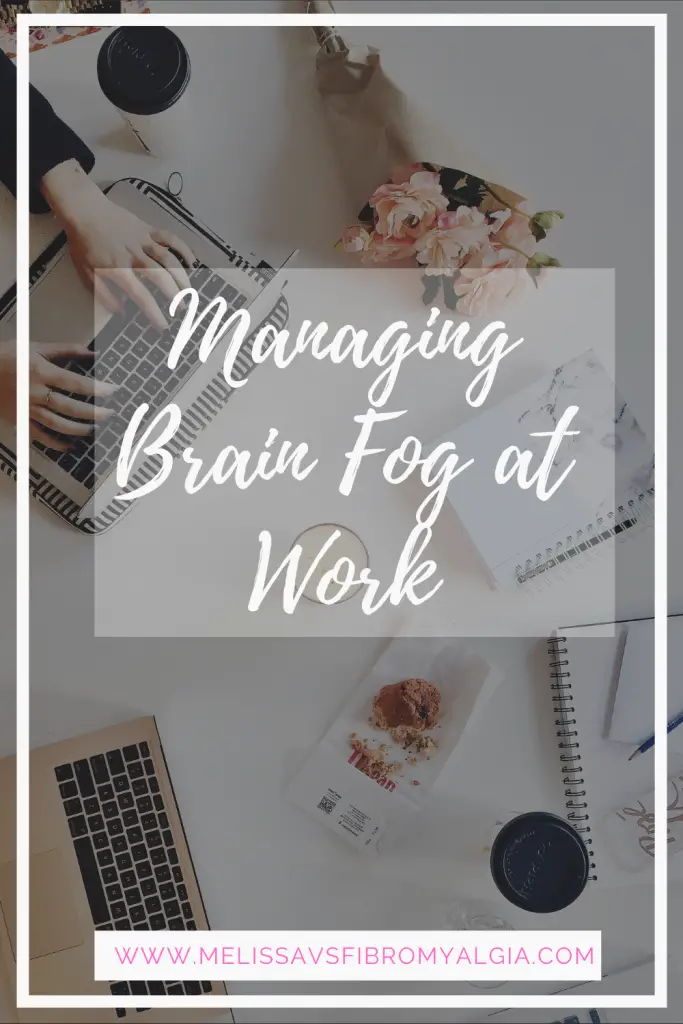Last Updated on October 19, 2021 by melissanreynolds
Managing fibro fog at the best of times is difficult, but how can you manage fibro fog at work? In this post I share five practical tips for managing fibro fog or cognitive dysfunction associated with chronic illness. This post was written a few years ago when I had just one baby. But all of these tips hold true at all times.

Starting a new job is both a time of increased fatigue and an opportunity to begin good habits for managing yourself.
In my first few weeks of a new job that bears more responsibility and has required a lot of fast learning, the fatigue levels have increased.
I have been experiencing some of the old brain fog side effects such as losing words (they’re right there but you just can’t reach them -so frustrating and really obvious!), muddling things up and just plain forgetting things.
Luckily there are a few ways to work with fibro fog at work
Fibro Fog at Work 1: Plan:
I make sure I have a master list of the key projects, a date schedule for key tasks/deadlines and a daily to-do list. I work off this through the day and spend 10 minutes before I leave writing the next day’s to-do list.
Fibro Fog at Work 2: Prioritise:
I have had a few pressing projects that I didn’t feel I could prioritise yet in hindsight I see one that could have waited a little longer!
Fibro Fog at Work 3: Rest:
This is a hard one with the baby, my morning is rushed and there isn’t much time for an afternoon rest. The weeks that my husband is on nightshift I try to take advantage and have him pick up baby so I can rush home and actually lie down with the heat pack. The weeks he is working until 6pm I just have to try to grab snippets of time to sit down.
Super charge your rest with Yoga Nidra – it is one of the four free tools in this Yoga for Fibromyalgia Series. Sign up for the free series here.

Fibro Fog at Work 4: Sleep:
Sleep is a problem for most people with Fibromyalgia, and it is a big struggle for me. If I’m lucky, I can spend about 9.5 hours in bed and achieve 8-8.5 hours of sleep. I have been making a point of getting to bed by 9.30 as often as I can to maximise sleep opportunity. I have found a relaxation technique where I imagine warmth and relaxation creeping slowly throughout my body starting at my toes, I rarely get to my head, and I find it really useful when I’m starting to get frustrated by my awakeness or discomfort.
Hint: My sleep has really improved since I started Low Dose Naltrexone, Recovery Factors Supplement and Yoga Nidra Guided Meditation.
Fibro Fog at Work 5: Gentle Exercise:
It can slip when you’re exhausted, learning a new routine and it’s cold. My knee problem hasn’t helped. However, even a 15 minute walk is counted as success at the moment. Keep it manageable and positive (build yourself up for what you do, don’t beat yourself up for what you don’t.)
If you want to try some gentle movement then check out this Beginner’s Yoga for Fibromyalgia class on my YouTube.
Do you have any other suggestions?
Do you need some help managing chronic pain and fatigue at work? The Working with Chronic Pain and Fatigue program combines practical tools for helping you to cope at work and things to do after work.


Have you ever had periods where you were unable to work due to Fibro?
Apart from being unable to work set hours until my son was 12 months old and reducing my hours to almost nothing in my third trimester, no. The Fibromyalgia came on slowly so I kind of adapted. I used to wonder why I didn’t just collapse from the amount of pain and fatigue, why the doctor didn’t help me, how other people did it (no one believed it was a thing). I think I was near a point where I would have ended up hospitalised (and unable to work) when I was able to move away with my family and reduce my hours to 3/4 time (financial viability precluded less). I now work 20 hours which I’m finding really tough. There have been so many points at which it would have been so easy to give up, but I just knew it would be that much harder to get back up. Plus I know i would be in pain and exhausted anyway so I strive to work as much as I can without making my life about coping instead of living.
The first year I got sick I couldn’t work, have had to give up jobs along the way due to the FM and have been off work for the past month due to it.
I’m sorry to hear that. It sucks. Hopefully it gives you space to focus on healing instead of pushing yourself through the work. X
That is the goal! 🙂